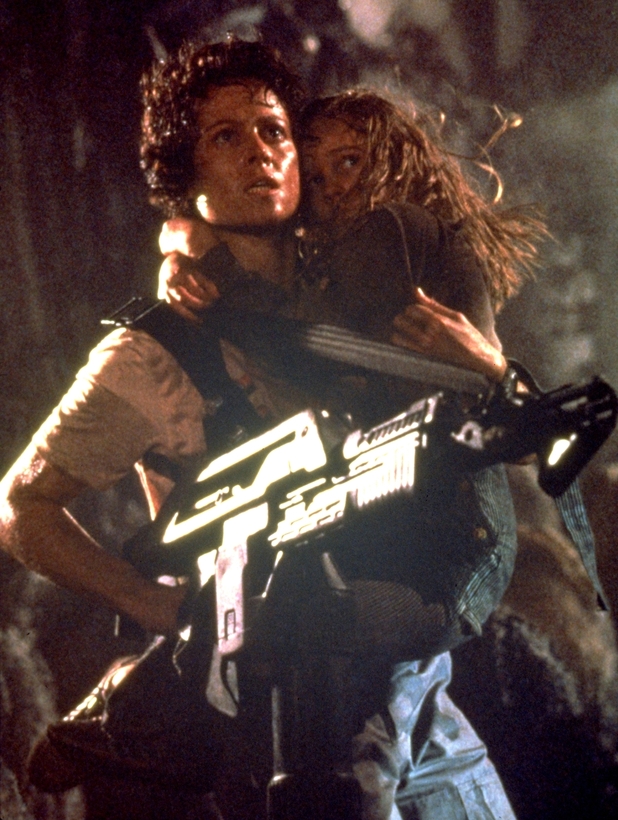Hey, readers!
Before we get going into the meat of this editorial of sorts, I am here to tell you that this is a sister article to an early post entitled "Why Do People Still Enjoy Action?" If you have not read through that piece yet, please go to the right and read it quickly before delving into the stuff here, since this is a sort-of spiritual follow-up.
With that being said, let's dig into the meat of my revelations.
I was flipping channels, as I typically do during afternoons when I am bored and have already watched all of my recorded stuff, and I stumbled upon the climax of Aliens. Having loved this film and its predecessor, I decided to catch the end where Ripley and Newt scramble through the station to escape its detonation, being chased by the Alien Queen. Even though I was catching it at the end, I felt myself very engaged with what was going on, and instead of flipping to something else, I stayed until the credits.
After turning my brain back on, I realized something.
Aliens is almost as iconic as you can get as far as action movies are concerned, and even after seeing it many times, I was not bored. I was excited. I cared about these characters and what was going on, even after just jumping in, and it was the mind-numbing action that I railed against in that last article.
In fact, some of my favorite movies have heavy amounts of action, such as Star Wars, or the Matrix. Despite the fact that these are now considered classics, there has to be something there that makes the action feel fresh every time instead of the recycled, explosion-heavy bad-assery that seems to have dominated action films this past decade or so.
So, what's the missing element? And is it also missing in our roleplaying sessions?
I've figured it out, and it's rather simple.
Tension; that's the missing element.
The three movies I've mentioned above work tension into their films almost flawlessly at just the right moments, making the action engaging and generating care for the characters if you liked them enough. In Aliens, Ripley may have her awesome gun, but she knows that both she and Newt are toast if the Alien Queen catches up to them, and the audience knows it too. In Star Wars, the Rebel Alliance is about to get their base destroyed by the Death Star, and they only have one shot to do an incredibly tricky maneuver against a huge amount of opposition. I still get goosebumps during the trench run. In the Matrix, everyone (except Neo, but we don't find that out until the end) are basically powerless to stop the Agents, so whenever they show up, the main characters are in serious trouble.
(Minor summer movie spoilers ahead for Star Trek: Into Darkness and Man of Steel)
Now let's contrast these elements against a few of the big summer blockbusters that are making their run this year. Was there tension in Star Trek: Into Darkness? At points, yes, but that is cheapened quite a bit when the back of your mind is reminding you constantly, 'They can't kill off Kirk. That would end the franchise. How are they gonna bring him back?' What about Man of Steel, which is likely going to be the highest grossing action film this year next to Iron Man 3? Well, it's kind of hard to feel tension when two incredibly super-powered people are punching each other through buildings with little regard for those who get in the way. That's not to say they didn't try, what with the 'Kryptonite-esque' aspects of the big planet-terraformer machine, but if memory serves, that didn't slow Superman down all that much.
Let's bring this back to roleplaying, shall we?
To me, it seems that GM's often sit in either one of two camps. Either they are looking to make everything as challenging as possible to compete with the players in some magnitude, or they are rather lenient, hold back, and put the story first. Are there some that sit between them? Undoubtedly, there has to be, but that is the breakdown I often see.
(This also depends highly on what system you are running, but I'm going to assume the lowest common denominator here. If you are running something ala Call of Cthulhu, your tension problems are taken care of by nature of the system itself.)
More often than not, I'm sitting in the second camp, but honestly? I don't want to anymore. That's because of this book.
I really don't want to steal this guy's thunder by reiterating everything he says in this book, but let me present this to you. Do you want action that is meaningful? Do you want your players to be engaged? Do you want to put the missing element of tension inside your games again, make them feel more alive?
Follow this man's advice: play dirty. Push your player characters to the limit. Provide consequences! While it may seem like an assholish way to run games at first, the rewards are incredible, and in the end, your players will thank you if they give enough of a damn.
I know I'm not providing a lot of my own advice on how to interweave tension into your games, but that is because I cannot do it better than this man has done. My goal is for your to walk away with two things: to think about how vital tension and suspense is to meaningful action, and to consider finding a way to read this book. It's that good.
I hope you enjoyed this semi-follow-up! If not, here's a funny picture.
-Wes





No comments:
Post a Comment